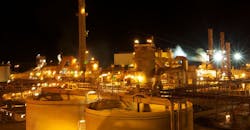China Leaving West Behind in Race for Electric-Car Raw Materials
China is first out of the blocks in the global race to secure raw material supplies critical for the batteries that will power the electric vehicles of the future.
Glencore Plc, the world’s top cobalt producer, agreed to sell about a third of its output of the metal to Chinese supplier of battery chemicals GEM Co., the Shenzhen-listed company said in a filing.
The three-year deal is set to shake the car industry as the biggest brands rush to lock down battery supplies essential to their survival in the coming electric-vehicle era. It also bolsters China’s dominance in the battery industry, coming a day after Volkswagen AG signed $25 billion of contracts with three of the biggest Chinese and Korean producers.
“It tells us once again that it is China rather than the western world who properly understands the raw material requirements and value of global vehicle electrification,” Paul Gait, an analyst at Sanford C. Bernstein Ltd. in London, said in a note. "They clearly get it; the West doesn’t seem to at the moment.”
China’s drive to secure other raw materials for batteries was also seen on Thursday as an Australian producer said giant manufacturer Shaanxi J&R Optimum Energy Co. had begun takeover talks to control one of the world’s newest lithium mines.
The biggest automakers are caught in an arms race to develop technology and supply chains needed to overhaul their gasoline and diesel fleets and roll out more electric cars over the next decade. Key to that are two huge cobalt mines run by Glencore in the Democratic Republic of Congo.
Glencore plans to double its output over the next two years in the country, which already produces about 65% of the world’s cobalt. The commodity giant has held talks with VW, Tesla Inc. and Apple Inc., as well as major battery makers, but GEM’s deal is the first major supply agreement made public.
Under the accord, GEM and its subsidiaries will lock in 13,800 metric tons of cobalt contained in hydroxide from Glencore this year. That rises to 18,000 tons in 2019 and 21,000 tons in 2020. The numbers represent about 35% of Glencore’s planned cobalt output this year, 28% the next and 33% in 2020.
With an almost four-fold jump in prices in the past two years, Glencore Chief Executive Officer Ivan Glasenberg has said the company would only sell on a floating-price basis that allows it to benefit from further gains. GEM didn’t disclose the pricing for its deal, and a Glencore spokesman declined to comment.
Mine to Plant
Volkswagen on Tuesday said it’s seeking to produce 3 million battery-powered vehicles a year by 2025. The plans are backstopped by deals with leading battery suppliers Samsung SDI Co., LG Chem Ltd. and Contemporary Amperex Technology Ltd., sufficient for the first wave of production, Chief Financial Officer Frank Witter told Bloomberg TV.
Businesses including Apple and BMW, as well as VW, have previously tried to strike supply deals directly with miners, an unprecedented step in such companies’ efforts to source manufacturing materials. This week’s events may indicate that it will be metals processors and battery producers which will take the lead in securing deliveries of the commodity.
GEM turns intermediate cobalt into other related chemicals that it sells to battery makers. It extracts most of its feedstock from recycled batteries and electronics, according to a bond prospectus published in November. The Chinese firm’s shares rose as much as 9.2% on Thursday.
GEM didn’t say whether it has signed onward contracts with makers of batteries or cars. However, the company is a major supplier to CATL, one of the battery makers backing up VW’s supply deal, according to a CATL initial public offering prospectus.
By Mark Burton and Tom Wilson
About the Author
Bloomberg
Licensed content from Bloomberg, copyright 2016.
